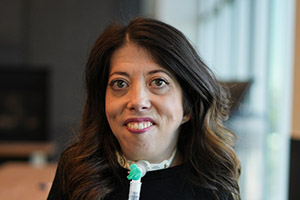What the World Needs to Know about Women with Disabilities

Kelie Hess
March is Women's History and Disability Awareness Month. Kelie Hess, a member of IDRPP who uses a wheelchair, shared her thoughts on what the world needs to know about women with disabilities.
"I think we women with disabilities have a unique perspective on life," Hess said. "We have to move throughout the world in different ways. We have to be creative about how we navigate life."
Hess continued by stating she beleives that disability inclusion has changed in the past two decades, "it's hard to pinpoint exact ways, but I feel like more people with disabilities are moving among society more, they're being seen more, I think they're starting to be heard more."
Although disability inclusion is progressing, Hess explains that she hopes individuals with disabilities will step up with even more confidence and power. Growing up in a world that was not designed for her disability often felt embarassing, but she now realizes that that feeling will only hold her back. "The older I get, the more I'm learning that that can't continue, that there's no reason to be embarrassed for [my disability]. There is a strength that comes from valuing what makes us different. Disability is a natural part of the human experience and not a part of life that anyone should ever feel ashamed of. I hope to see more of us choosing to be bold, and to be unapologetic for what we need to be successful, to be included in society and to be heard in society."
Being bold, according to Hess, can be taken in little steps within the individual or in larger positions in the community. "I hope to see more women with disabilities taking leadership roles. Serving in public office is a good start. Having a voice when it comes to policy and legislation would be incredible. What I hope to see is that women start being less apologetic for the space they take up in the world.
"They can be bold, they can be brave within their own life, and they can move forward with confidence no matter what their abilities are. I want them to know that they have something that is so valuable, and so worthwhile. And that the insight and perspective and voice that they have should be shared."
Individuals who do not have a disability may need a shift in perspective in order to be more accepting of these courageous, bold women with disabilities, Hess explained. She said, "For so many years, people with disabilities just kind of kept to the sidelines. But now, they're starting to make their way more towards the middle and they're starting to share their voice and their perspective, and they're starting to kind of carve out a spot for themselves within society.
'And I think that the more that that happens, the more that people who don't experience disability or are not exposed to disability, they start to see it, they start to interact with people who have disabilities, and they start to realize that it's not something scary, or it's not as different as they might have imagined it to be."
According to Hess, diversity and inclusion is a powerful and crucial element for society to flourish. She said, "If we all are following the same pattern, then we kind of lose sight of all the possibilities that exist. And I think that's a recipe for not living our very best as far as a society, as a whole. I think that each person has a unique voice and perspective, and especially women with with disabilities. That's a perspective that should be heard and it deserves to be heard. ... Not everyone experiences life in the same way, and that's a good thing. That's a beautiful thing."
The biggest thing Hess would like people who do not have a disability to start changing is to shift how they view people with a disability. "Just look at the person and try to not ignore their disability, because disability isn't something that needs to be ignored or glazed over. But just look at who the person is, what their personality is, what their contributions and strengths are, and focus on that instead of a wheelchair, or whatever a person's individual needs look like. Let go of those assumptions. It's definitely a process, but it's a practice that I think all of us, even people with disabilities, need to take on more."

